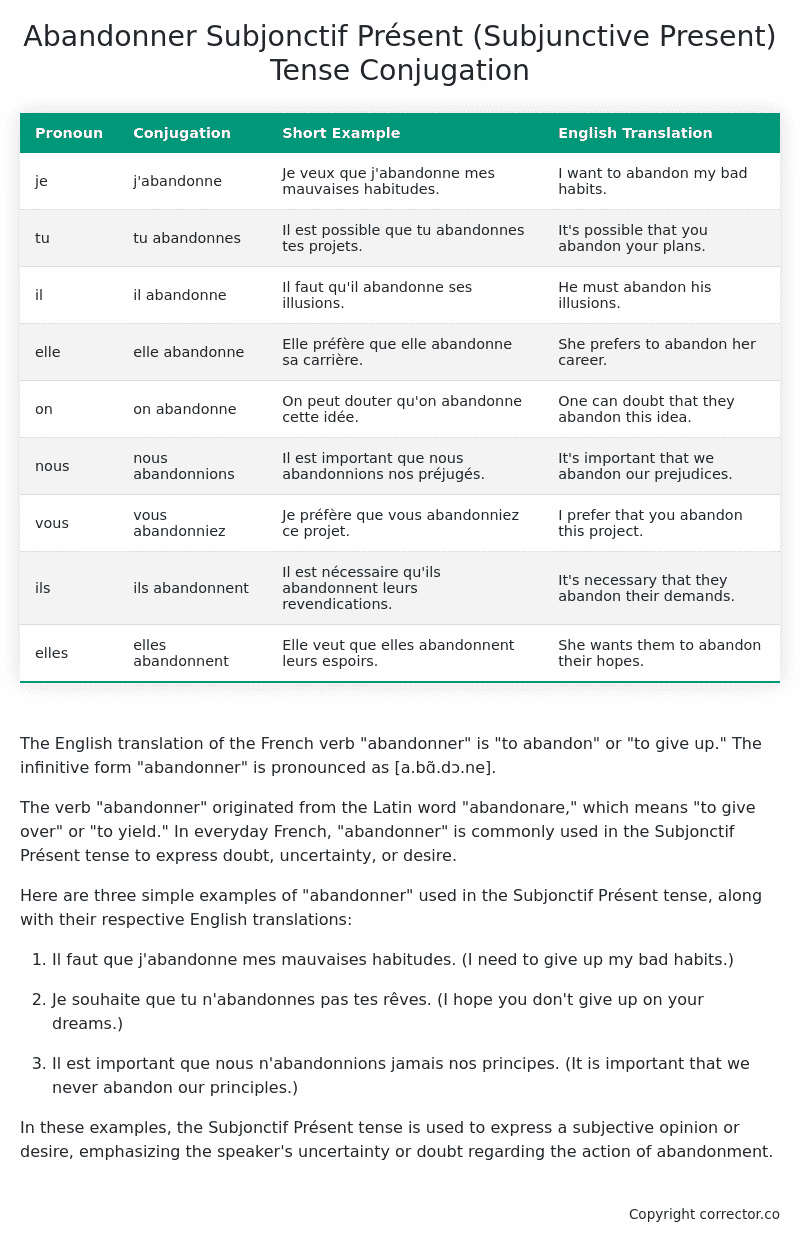Subjonctif Présent (Subjunctive Present) Tense Conjugation of the French Verb abandonner
Introduction to the verb abandonner
The English translation of the French verb “abandonner” is “to abandon” or “to give up.” The infinitive form “abandonner” is pronounced as [a.bɑ̃.dɔ.ne].
The verb “abandonner” originated from the Latin word “abandonare,” which means “to give over” or “to yield.” In everyday French, “abandonner” is commonly used in the Subjonctif Présent tense to express doubt, uncertainty, or desire.
Here are three simple examples of “abandonner” used in the Subjonctif Présent tense, along with their respective English translations:
-
Il faut que j’abandonne mes mauvaises habitudes.
(I need to give up my bad habits.) -
Je souhaite que tu n’abandonnes pas tes rêves.
(I hope you don’t give up on your dreams.) -
Il est important que nous n’abandonnions jamais nos principes.
(It is important that we never abandon our principles.)
In these examples, the Subjonctif Présent tense is used to express a subjective opinion or desire, emphasizing the speaker’s uncertainty or doubt regarding the action of abandonment.
Table of the Subjonctif Présent (Subjunctive Present) Tense Conjugation of abandonner
| Pronoun | Conjugation | Short Example | English Translation |
|---|---|---|---|
| je | j’abandonne | Je veux que j’abandonne mes mauvaises habitudes. | I want to abandon my bad habits. |
| tu | tu abandonnes | Il est possible que tu abandonnes tes projets. | It’s possible that you abandon your plans. |
| il | il abandonne | Il faut qu’il abandonne ses illusions. | He must abandon his illusions. |
| elle | elle abandonne | Elle préfère que elle abandonne sa carrière. | She prefers to abandon her career. |
| on | on abandonne | On peut douter qu’on abandonne cette idée. | One can doubt that they abandon this idea. |
| nous | nous abandonnions | Il est important que nous abandonnions nos préjugés. | It’s important that we abandon our prejudices. |
| vous | vous abandonniez | Je préfère que vous abandonniez ce projet. | I prefer that you abandon this project. |
| ils | ils abandonnent | Il est nécessaire qu’ils abandonnent leurs revendications. | It’s necessary that they abandon their demands. |
| elles | elles abandonnent | Elle veut que elles abandonnent leurs espoirs. | She wants them to abandon their hopes. |
Other Conjugations for Abandonner.
Le Present (Present Tense) Conjugation of the French Verb abandonner
Imparfait (Imperfect) Tense Conjugation of the French Verb abandonner
Passé Simple (Simple Past) Tense Conjugation of the French Verb abandonner
Passé Composé (Present Perfect) Tense Conjugation of the French Verb abandonner
Futur Simple (Simple Future) Tense Conjugation of the French Verb abandonner
Futur Proche (Near Future) Tense Conjugation of the French Verb abandonner
Plus-que-parfait (Pluperfect) Tense Conjugation of the French Verb abandonner
Passé Antérieur (Past Anterior) Tense Conjugation of the French Verb abandonner
Futur Antérieur (Future Anterior) Tense Conjugation of the French Verb abandonner
Subjonctif Présent (Subjunctive Present) Tense Conjugation of the French Verb abandonner (this article)
Subjonctif Passé (Subjunctive Past) Tense Conjugation of the French Verb abandonner
Subjonctif Imparfait (Subjunctive Imperfect) Tense Conjugation of the French Verb abandonner
Subjonctif Plus-que-parfait (Subjunctive Pluperfect) Tense Conjugation of the French Verb abandonner
Conditionnel Présent (Conditional Present) Tense Conjugation of the French Verb abandonner
Conditionnel Passé (Conditional Past) Tense Conjugation of the French Verb abandonner
Conditionnel Passé II (Conditional Past II) Tense Conjugation of the French Verb abandonner
L’impératif Présent (Imperative Present) Tense Conjugation of the French Verb abandonner
L’impératif Passé (Imperative Past) Tense Conjugation of the French Verb abandonner
L’infinitif Présent (Infinitive Present) Tense Conjugation of the French Verb abandonner
L’infinitif Passé (Infinitive Past) Tense Conjugation of the French Verb abandonner
Le Participe Présent (Present Participle) Tense Conjugation of the French Verb abandonner
Le Participe Passé (Past Participle) Tense Conjugation of the French Verb abandonner
Struggling with French verbs or the language in general? Why not use our free French Grammar Checker – no registration required!
Get a FREE Download Study Sheet of this Conjugation 🔥
Simply right click the image below, click “save image” and get your free reference for the abandonner Subjonctif Présent tense conjugation!

Abandonner – About the French Subjonctif Présent (Subjunctive Present) Tense
Formation of the Subjonctif Présent
Common Everyday Usage Patterns
Interactions with Other Tenses
Summary
I hope you enjoyed this article on the verb abandonner. Still in a learning mood? Check out another TOTALLY random French verb conjugation!


